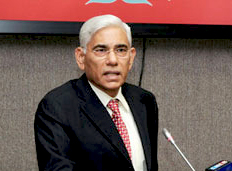
New Delhi, November 23: The office of the Comptroller and Auditor General Friday refused to join issue over a former auditor's claims on 2G spectrum allocation that have sparked a political row, saying it does not react to media reports.
"We do not react to media reports about our reports," a CAG official said tersely when IANS sought a response from the country's official auditor.
R.P. Singh, who was Director General of Audit with the CAG of India, in an interview with a private television channel Thursday claimed that thwe opposition Bharatiya Janata Party's senior leader Murli Manohar Joshi as the chief of the parliamentary panel inquiring the 2G scam had spoken to CAG officials a day before the 2G report was released.
Singh also in the interview questioned the CAG's estimate of the presumptive loss of Rs.1.76 lakh crore in the 2G spectrum allocation.
He said the loss due to the first-come-first-served policy then followed by the government was Rs.37,000 crore and this too was entirely "recoverable".
Rubbishing all this, the CAG official told IANS, "The CAG report in question (the Rs.1.76 lakh crore loss) bears the counter signature of R.P. Singh who was the DG and was the auditor concerned for the telecom sector."
Singh's claims, however, have provided fodder for the ruling Congress party to go on the offensive on the 2G scam and attack the BJP and the CAG.
After a meeting of the Congress core group, Sonia Gandhi said she thought the BJP has been "exposed".
The Left also said the BJP as well as the CAG should respond to the allegation.
But Joshi, who heads the Public Accounts Committee, said: "This man (Singh) himself presented the report to the PAC. Why didn't he say that he did not agree at that time.
All this is an attempt by the government to malign the CAG and R.P. Singh is a part of that attempt. "
"The government is targeting the institution of the CAG to hide its own misdemeanours. It is a part of that campaign," Joshi added.






Comments
Add new comment